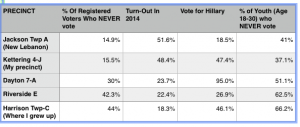As Democrats, we should acknowledge that we can’t out-polarize the Republicans. We can’t be more divisive than they are. The battle of partisanship is not a battle we seem to be able to win. We should fight a battle we can win. We need to capitalize on our big advantage. Our big advantage is the system itself — if it is a system that works as it should. If the system was fair — if our system of representative democracy worked to produce a government for the people — Democratic candidates would be elected in droves, Democratic policies would be enacted.
To be the party of the people, the Democratic Party must change. We now are the party of a Democratic oligarchy. Of 1.4 Million Ohio Democrats, for example, David Pepper was chosen to be the ODP Chairperson by a committee of only 148 — only 66 elected during a Democratic Primary, the other 82 party insiders. Of the 40,000 Democrats in Montgomery County, only a handful have a voice in the local party organization. The MCDP has operated with a “political boss” structure stretching back to its beginnings.
Hopefully things are changing for the MCDP. This past June at the MCDP Reorganization Meeting several changes to the MCDP Constitution were approved that, if implemented, would mean a big change in the organization. The new MCDP Preamble says: “WE THE REPRESENTATIVES of the Democrats living in Montgomery County — in order to form a strong party organization that empowers representative democracy within our party and throughout the county — do establish this Montgomery County Democratic Party Constitution.”
Strengthening representative democracy sounds great — it is easy to talk the talk. The challenge for Democrats in Montgomery County is to transform the MCDP so that it does the following:
- Empowers representative democracy within our party and
- Empowers representative democracy throughout the county.
The MCDP Central Committee historically has simply been a rubber stamp. But, constitutionally, the Central Committee is empowered to act as a deliberative body, governed by Robert’s Rules. The Central Committee members simply need to step up to the challenge. My hope is that the influx of new members — from the efforts of Tim and Alison Benford — will be fully engaged in the Committee.
The Reorganization Meeting also approved this statement of purpose for the MCDP:
The purpose of the Montgomery County Democratic Party is to represent and to serve Montgomery County Democrats. The MCDP advances this purpose: by connecting Montgomery County Democrats within an extended MCDP community where every member has a voice, by advancing candidates of the people who are dedicated to public service and whose principles align with those of the Democratic Party.
Imagine the strength of the party if we could engage even 5% of Montgomery County Democrats — 2000 individuals — in a connected and caring community where everyone has a voice.
The Preamble to the MCDP Constitution calls not only for empowering representative democracy within the MCDP, it also calls for empowering representative democracy “throughout the county.” Again, the Central Committee should agree to a plan.
As Democrats we must shift our understanding of the contest we are in. We are distracted when we focus on the Democratic Party winning. We need to look deeper and see that the central contest of politics today is the contest to make our system of representative democracy work as it should. The Republicans seem to realize that if the system worked as it should, the public policies they advocate would not have a chance. It’s to their advantage to aggravate polarization, to advance misinformation and to repress voting. It’s to the advantage of Democrats to do the opposite.
Democrats need to focus on the contest that is winnable. We can win the contest to be the party of the people.
























